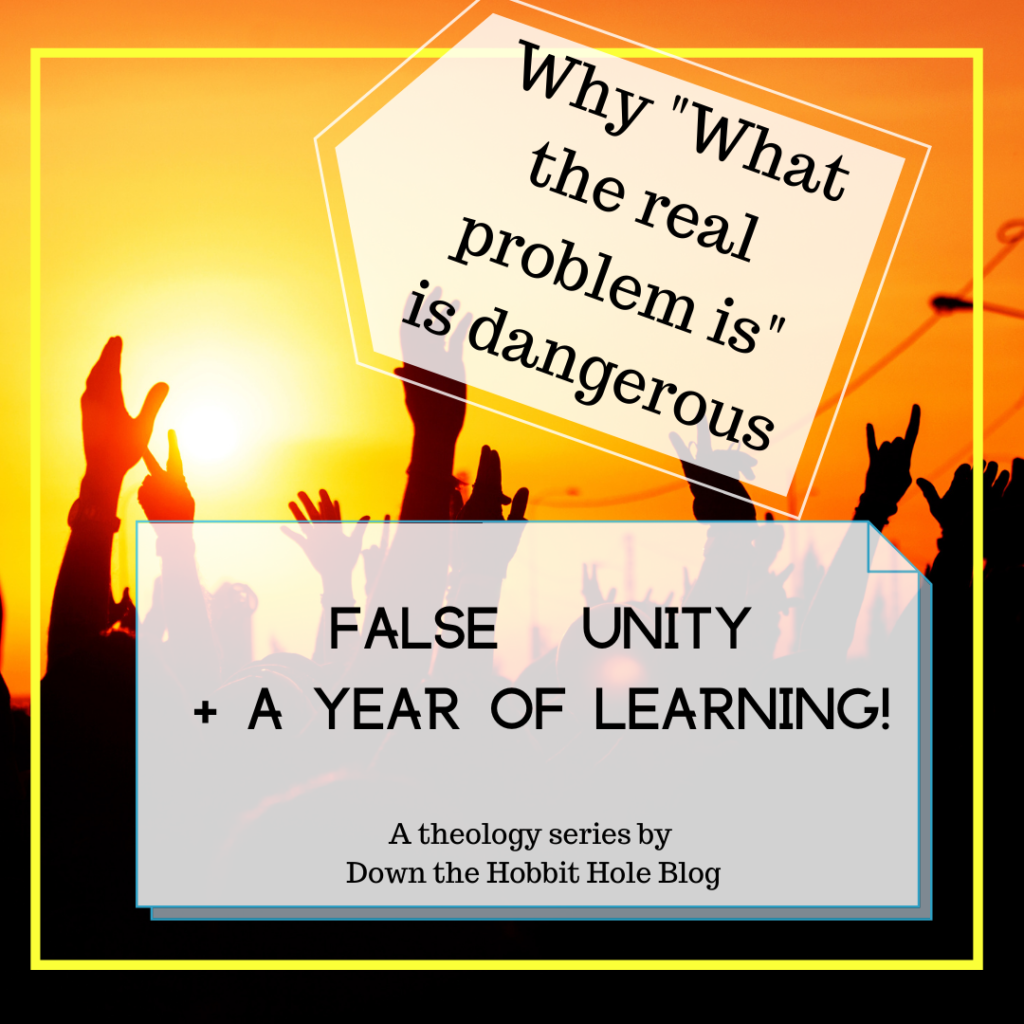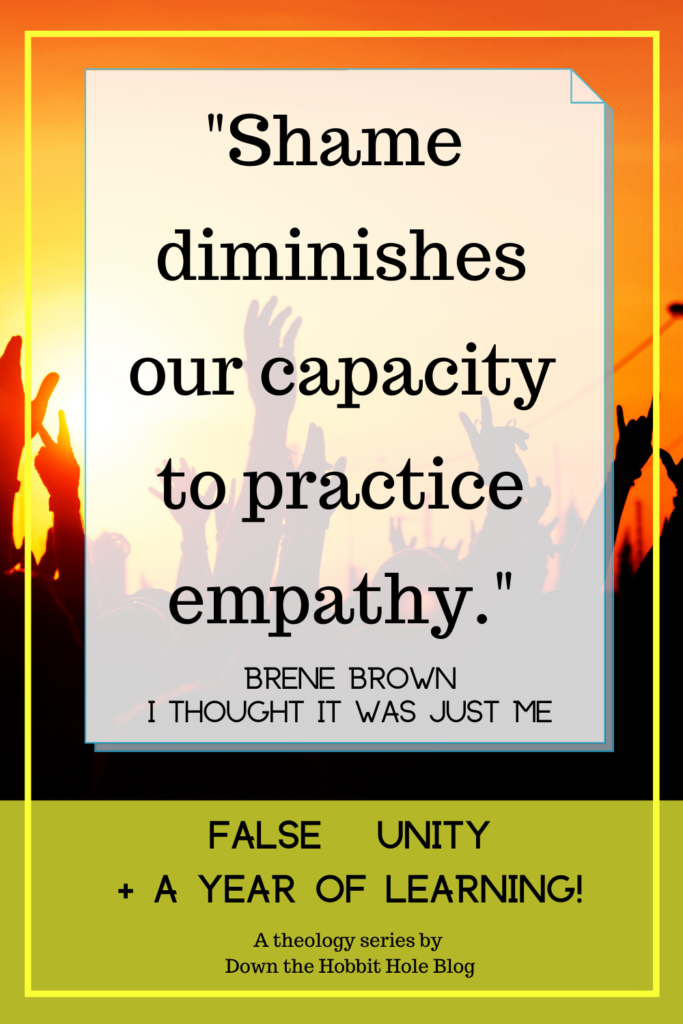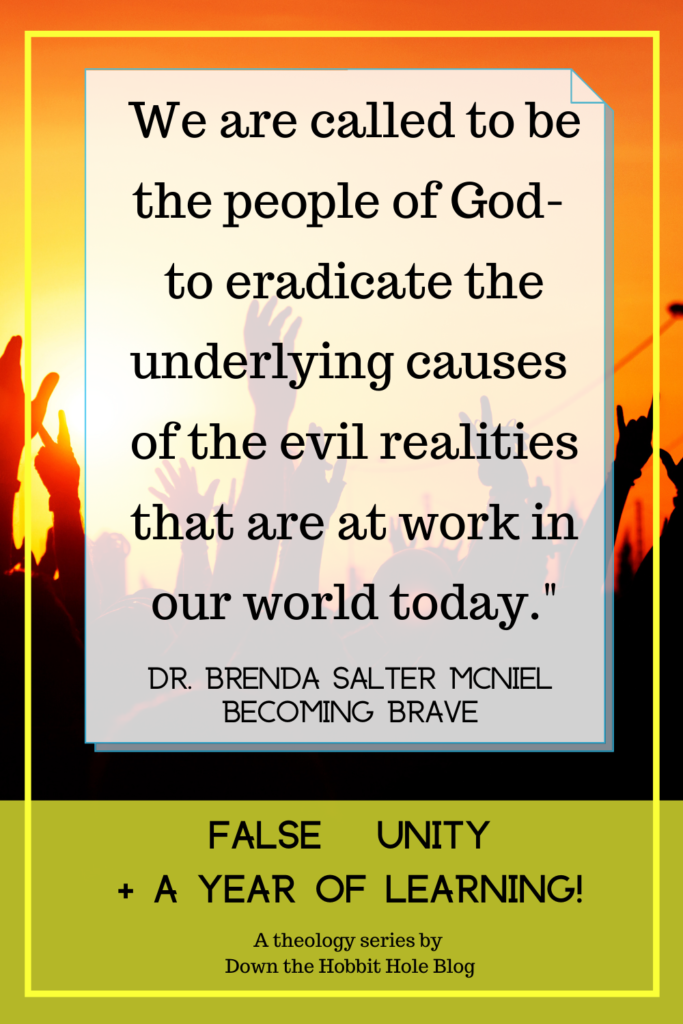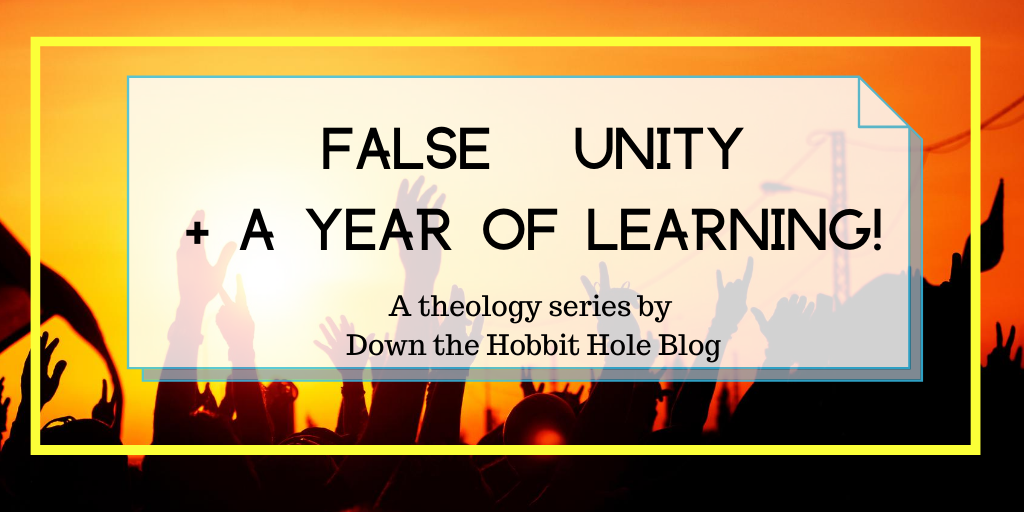Written on September 14th, 2020 by The Elf from Down the Hobbit Hole Blog, This post contains affiliate ad links, you can find out more on our policies page or in the disclaimer at the bottom of the blog.

False Unity: Why “What the real problem is” is dangerous.
Welcome to post number two in our False Unity theology series. Today we’re looking at fear mongering and advocacy. In this case, advocacy is speaking out in the best interest of people, or to change a policy or system in place that impacts people. This is usually done for a general grouping of people. (i.e. I am an advocate for kids, for religious freedoms, or for education) Fear mongering being intentionally spreading a fear filled rumor, or an exaggeration of an event, meant to scare or misinform the general public.
The spreading of fear or exaggerated information, even through memes, is harmful, manipulative, and adds to fear.
You can find our first post that discusses unity and the Letter from a Birmingham Jail here. Our third post will focus more specifically on advocacy.
Why False Unity?
What About Unity is False?
The call for unity has been so confusing lately. We’ve seen it used in so many places. As a rallying cry by so many Christian leaders. And there is so much hate and negativity that a call for peace and unity is tempting, but it still feels wrong. Why?
So many are calling for comfort or conformity over walking into the messy work of justice, change and conversation. Unity itself is defined as combing part of a whole. So reaching to help and connect with someone who is in need is in fact a unifying action.
What we are addressing here is using the terminology of unity to distract or stop conversation and action. Specifically as it relates to social justice. It’s a false unity.
from our first post on unity.
A False Dilemma Fallacy
How many memes or posts have you seen in the past few weeks that have said “What we really need to focus on”, “The real tragedy is”, “The actual pandemic is”, “What you really need to be afraid of” etc…
The argument that one thing is more important, or more of a catastrophe than another is an illogical argument.
Let’s take the raging wildfires in California and Colorado right now. It wouldn’t be logical for someone from Louisiana to say “Everyone’s talking about the property destruction of the wildfires, but that’s not a big deal- everyone should really be focusing on the property damage from the hurricane. That’s more real!” Both things have taken lives and both have caused over a billion dollars worth of damage. To the person in Louisiana- the hurricane is a lot more prevalent and personal but it doesn’t detract from the pain of the person whose home and property were just burnt and destroyed. They are both real and damaging.
A false dilemma fallacy says that there are only two possibilities and that one is more real or important than the other. Saying that one form of advocacy is more important than another is manipulative and wrong. It’s a non binary issue, but is being treated as a binary (or two part only) issue. (Shout out to my cousin for teaching me the importance of those terms this year.) And even sharing a meme that says something like this, or exaggerates the truth of a story is adding fuel to fear.
Shutting Down Others Stories

One of the things that has bothered me the most, and why we decided to write this series, was seeing Christians in leadership using the call for peace and unity to stop someone from sharing their own story. Or using a selected Scripture passage to shut someone’s advocacy down.
Why do we assume it’s ok to use the Bible to end discussions instead of as a place to start them?
Now I’m as big of a fan of the Youversion Scripture images as anyone, really, I’m a big fan. But not when it’s used to shut someone up. Or end an argument. OR tell someone they are being a stumbling block by sharing their stories. No thanks.
I’ve read ‘enough’ and ‘please don’t post divisive things like this’ on people’s personal experiences (and vulnerable posts!) more than I can count. Not to mention the ones on articles shared. In response to me commenting about my own personal experience with adoption and the church I’ve had people tell me I was wrong and did not understand the theology behind MY OWN EXPERIENCE. Talk about being stumbling blocks!!
And then we circle back around to the posts about one experience, story, or type of advocacy being more important than another. The endless memes telling you what you really need to be afraid of right now. Again- this is being used to silence people and add to fear, regardless of whether or not that was the intention of the poster. To scare people away from change, progress and sharing their own testimonies.
Not only is that not calling for unity. It’s manipulative. It’s silence for the sake of comfort and conformity at best. Shutting them up with Scripture and fear mongering at worst.
It’s certainly not helping anyone. And if it’s not helping, could it be hurting?
Brene Brown, in her book I Thought it Was Just Me (But It Wasn’t), says this on opening ourselves up to others experiences…
“I’ve come to a place in my life where unlearning prejudice is more important than avoiding situations where I might be accused of saying or doing the wrong thing. I’ve learned that it is better for me to accept the fact that I struggle with many of the same learned biases that other people do. This had allowed me to spend my energy unlearning and changing my prejudices rather than proving I don’t have any.
When we are honest about our struggles, we are much less likely to get stuck in shame. This is critical because shame diminishes our capacity to practice empathy. Ultimately, feeling shame about privilege actually perpetuates racism, sexism, heterosexism, classism, ageism, etc. I don’t have to know “exactly how you feel”. I just have to touch a part of my life that opens me up to hearing your experience…Imagine what it would be like if we could only reach out to folks who have had our exact experiences. We would all be very much alone.”
PS- Find our lessons from her Netflix special “The Call To Courage” HERE!
These things can all be important and worthy of Christian advocacy
If anyone is being oppressed, in need, or in pain they are in need of unity. In need of the lifelines of practical love and Jesus from those around them. Saying that someone’s pain is unimportant or irrelevant isn’t just un-Christlike. It’s wrong and dangerous.
This powerful quote from Becoming Brave, which we reviewed here, has been really impactful to me.
“We cannot abdicate our responsibility and role in this vital work. We are called to be the people of God- to eradicate the underlying causes of the evil realities that are at work in our world today.”
Rev. Dr. Brenda Salter McNeil: Becoming Brave

Let’s look at a few of the things that have cropped up during this intense season we are in.
- Human trafficking is an important issue. So is the health pandemic. One tragedy is not more or less frightening or important. Both are claiming lives and causing irreparable damage.
- You can advocate for children on the border, in foster care and the unborn children at the same time. There’s actually a LOT of intersection.
- We can advocate for more education and resources for the police (just like in other realms of public service) and support the people doing the job. While also being upset about the pain and loss of lives that are a direct result of injustices being allowed in their jobs. Specifically when these disproportionately impact people of color.
- We can advocate for change and peaceful protests as a form of evangelism, unity, and peace bringing. (and over 90% of the Black Lives Matter protests have been peaceful, check out this report for more. Or this article on why we should march.)
- We can boldly proclaim that Black Lives Matter- unifying with people that have been oppressed. It’s a form of unification. It’s a call for change, healing, and hope for a brighter future.
- At the same time, we can also call for an end of modern day slavery- human trafficking. The adult side, the kid side, the sexual exploitation side, ending the pornography trade business side. ALL OF IT.
- Disagreeing with someone and still being kind. Which goes along with not stepping up to every fight you are invited to. We can advocate, be grieved, and live with passionate courage and still be gracious and joy filled.
Justice Is Deserving of More than Empathy
All of it is worthy.
There’s need, how can we tithe our time and resources?
What can we do to help?
Considering the weight of our words, what do we need to consider before we comment or share?
How can we reach into other people’s pain to help them and unify with them?
We cannot be convinced that justice is unnecessary by gas-lighting. You can find out more about gas lighting here. Justice is not something we need to just empathize with, it is worthy of our time and action.
What Next?:
**Find our Year of Anti-Racist Learning document here from our last post**
-Next week will be our third post in the False Unity series. We’ll talk more about advocacy.
-You can find the first post, about how relevant the Letter to the Birmingham Jail is here.
-And check out some of our other faith posts:
*Mother Theresa and Impostor Syndrome
*How a bird changed the way this scholar read the Bible
*5 Lessons from Narnia on Communication
Down The Hobbit Hole Blog and this best grandparents in Literature, best grandparents on TV and best grandparents in movies post use affiliate links. We only link products we think you’ll like. So, you are never charged extra for them. As Amazon Associates, we earn from qualifying purchases at no additional cost to you. We also use cookies to gather analytics and present advertisements. This allows us to keep writing discussion questions and telling ridiculous dad jokes. Also, find our other reviews with discussion questions here. Our posts about faith here. Lastly, our posts about family stuff here.
